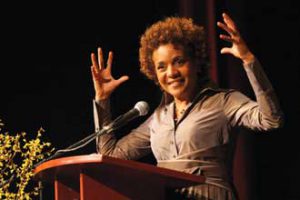
By Pascal Zamprelli
“It is urgent that we, as a global community, begin asking ourselves a few critical questions,” suggested Her Excellency Michaëlle Jean, Governor General of Canada, as she addressed a packed Moyse Hall last Thursday.
“In this era of globalization, how do we reconnect citizens with their inner and collective power to effect change? How do we breathe new life into the universal principles of fellowship, human dignity, compassion, justice and freedom? How do we revitalize the public sphere? For each of these questions, I have seen hundreds of young people identify and implement concrete solutions.”
Jean was on hand to deliver the Jeanne Sauvé Inaugural Address, Youth Engagement in the 21st Century: Inspiring Change in an Era of Globalization, an issue she called “close to my heart.” The Sauvé Scholars Program, established by the Jeanne Sauvé Foundation named in honour of Canada’s first woman governor general, brings up to 14 promising youths from around the world to McGill for the academic calendar year (see sidebar on page 12.)
The urgency of the questions Jean put to the audience stems from what she feels are the negative effects of globalization being felt across a world “in which spaces for critical debate, reflection, and civic action are increasingly being assailed by the alluring sirens of fleeting gratification and cultural conformity.” Increasingly, she said, market forces are influencing public life and challenging the notions of the common good and altruistic action.
“Globalization,” she continued, “has become synonymous with the logic of wealth accumulation, diminishing the capacity of citizens, and even entire societies, to tackle challenges in their communities, their countries, and the wider world.”
But after meeting and being inspired by youth around the globe through her official duties over the last five years, Jean clearly sees hope for something better. “A completely new generation of young people is actually using the instruments of globalization as critical tools of engagement, reviving the very ancient concept of citizenship,” she said.
Jean cited a burgeoning worldwide urban arts movement to illustrate her point. “Art is about sowing the seeds of hope in places left barren by the fend-for-yourself mentality.”
For Her Excellency, examples of this phenomenon abound: the Graffiti Gallery in Winnipeg that has led to lower crime rates; organizations like Apathy is Boring, which use art and technology to engage and empower younger voters; and Blueprint for Life, a grassroots break-dance collective for Inuit youth.
“Let me tell you,” she said of these bold youth-driven initiatives, “this is actually saving many, many lives.”
She lauded young leaders for sharing a desire to shatter the barriers of cultural differences, prejudice, exclusion, racism and ignorance in their efforts to foster understanding and collaboration.
These young people are engaging in “the globalization of solidarities,” which she explained “refers to citizens saying No to a world in which survival-of-the-fittest dictates social relations.”
Jean sees the reaction to the recent devastation in her native Haiti as evidence that this better world is possible. “The unprecedented outpouring, which seems to have endured even as the humanitarian crisis no longer leads the headlines, leaves me hoping that we have all the reasons to believe that we are participating in the emergence of a more fraternal world,” she said.
But to reach that goal, we must follow the example of the Sauvé Scholars, and all take our share of responsibility in embracing and promoting civic engagement. “Every gesture counts,” Jean concluded, “every action matters.”
Sauvé Scholars share personal stories of triumph, tribulation
Every year since 2003, the Sauvé Scholars Program has welcomed young leaders from around the world to McGill for a year, during which they live and work together, enjoy unlimited access to McGill’s academic programs and resources, and benefit from interaction with McGill mentors.
Following the Governor General’s speech, some of the current Sauvé Scholars shared their stories about how they became socially and politically engaged:
Gabriel Bran Lopez, Founding Executive Director, Youth Fusion.
“One of the great ways of mobilizing youth is to give them the tools to get involved, because if we don’t provide them with mentors and resources, they’re not going to be able to achieve their full potential.”
Janet Jobson, South African Rhodes Scholar and social activist.
“I realized [after a rally for apartheid survivors was shut down by police] that even in a democratic society, even when you assume all the victories have been won, people can still be silenced. And that moment really solidified for me the importance of always speaking out, and always trying to create space for dialogue and for critical issues to be brought up.”
Eloge Butera, McGill Law student.
“Sixteen years ago I lived through the genocide against Tutsis in Rwanda. I know war. I know terror. When I moved to this wonderful country, I realized that distance sometimes creates an illusion of living in a world apart. Canadians had a hard time understanding what we really lose when we allow genocide to happen. Teaching that compassion and empowering my peers to dream of making a difference and learning through acts of compassion has been my work and continues to inspire me. We are bigger than the sum of our individual selves.”
Mirwais Nahzat, Founder, Centre for Afghanistan Progress.
“I decided to become involved because I am a product of war. I grew up as a child confronted with violence and tyranny, walking to school and remembering the blood-stained bodies, houses destroyed, lives shattered. But all those experiences would have led nowhere without the generosity and compassion of this country. That compassion is epitomized in our actions, in the presence of the audience, and in our continued commitment to say no to injustice.”
